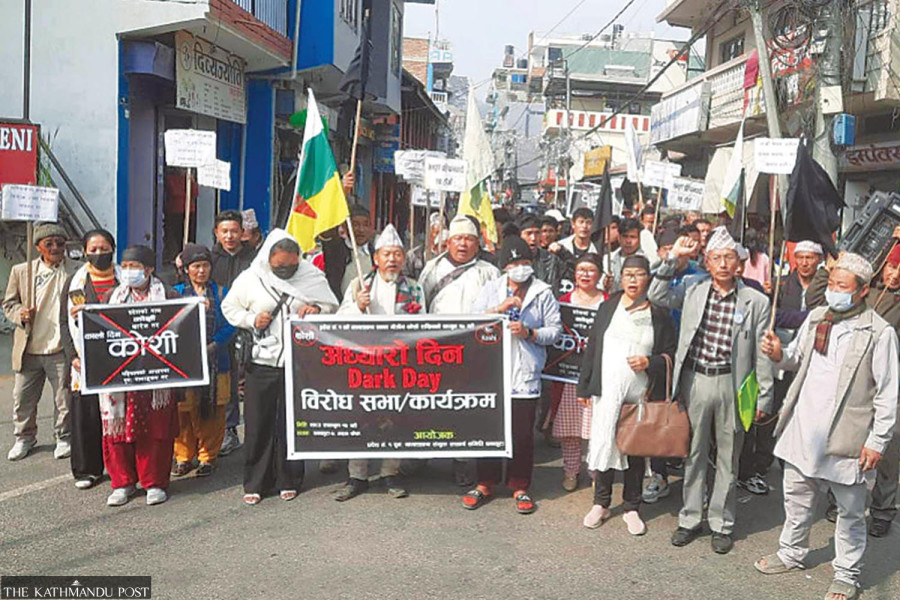Politics
Issue of province name resurfaces in Koshi after a months-long hiatus
Provincial government forms three-member talks team as dissidents plan protests.
Purushottam Poudel
As various ethnic groups raising their voice for identity-based nomenclature of Koshi Province prepare to resume their agitation, the provincial government is considering holding talks with them.
The provincial government has formed a talks team weeks after the groups dissatisfied with the province’s nomenclature announced a ‘new and decisive’ agitation.
On November 18, the Province 1 Renaming Joint Struggle Committee had held a press conference to announce the movement.
Nearly a month later, on Thursday, the provincial government formed a three-member dialogue committee led by Minister for Economic Affairs and Planning Ram Bahadur Magar. Internal Affairs and Law Minister Rewati Raman Bhandari and Minister for Physical Infrastructure Development Bhupendra Rai are its members while the secretary of the Ministry of Internal Affairs and Law serves as its member-secretary.
A provincial assembly meeting had named Province 1 as Koshi on March 1 last year. The name, proposed by the CPN-UML, was endorsed by an overwhelming majority, with assembly members from the Nepali Congress, the CPN (Maoist Centre), and the Rastriya Prajatantra Party (RPP) voting in its favour.
But the nomenclature did not sit well with various ethnic groups that had been demanding the province be named after the ethnic identity of the dominant communities residing in the province. The groups then took to the streets against the nomenclature.
Amid this, on December 8, members of the struggle committee tried to show a black flag, as a symbolic protest, to Prime Minister KP Sharma Oli while he was visiting his home district of Jhapa.
Minister for Internal Affairs and Law Bhandari said that there are various issues related to community, identity and ethnicity that have emerged in the province and may arise in the future as well. “The dialogue committee will find solutions to these issues through negotiations in line with the constitution and laws,” he said.
The dialogue team has yet to start its work. As Sunday is a public holiday, the committee is likely to hold a formal meeting with the agitating groups on Monday, Bhandari said.
“We can talk jointly or separately with different groups—it will be determined by the terms of reference (ToR) that our committee formulates,” Minister Bhandari added. “At present, at least eight to nine groups are protesting by taking up identity issues.”
The agitating groups have also been demanding that Maithili be designated the official language of the province, Minister Bhandari said.
But Govinda Chhantyal, an identity-based rights activist, differs with the minister. “The identity movement has been raising the issue of language long before the issue of naming the Koshi emerged,” he said.
“While the government recognised 12 official languages, Limbu and Maithili were recognised as the official languages of Koshi Province,” Chhantyal added. “We have since then been linking the language issue with the identity movement.”
In 2021, the language commission submitted its report to then President Bidya Devi Bhandari and then Prime Minister Sher Bahadur Deuba, recommending 12 languages, including Nepali, as official languages.
Koshi Provincial Assembly member from Nepali Congress Shamsher Rai emphasises the importance of resolving outstanding issues through dialogue. The previous government held talks with the agitating groups twice. Although the talks had progressed positively, the change of government at the centre and the province later affected them, Rai said.
“Both sides should opt for dialogue,” Rai said.
Prem Yakten, coordinator of the struggle committee accused the current provincial government of ignoring the problem.
“If the government ignores our movement, we will intensify it in other provinces too,” coordinator Yatken said. “The main agenda of our protest is to rename the Koshi Province.”
Soon after the provincial assembly named the province as Koshi, the agitating groups started disruptive activities. Authorities had to announce prohibitory orders in the province for a few days.
Upon reaching an agreement on February 9 with the Kedar Karki-led government, the agitating groups had halted their protests. They later contested in the subsequent by-election held in Ilam-2.
In the April by-election held to elect a federal lawmaker from Ilam-2, two activists of the Province-1 Renaming Joint Struggle Committee—Dakendra Limbu and Milan Limbu—contested the seats.
Dakendra fought as an independent candidate while Milan contested as a candidate from the Rastriya Swatantra Party (RSP). Dakendra secured third position with 11,457 votes; CPN-UML’s Suhang Nemwang, the son of former Speaker late Subas Nembang, won the election.
“The by-election held earlier this year boosted our confidence and the election result justified our movement,” Yakten said.
“We had reached a five-point agreement with the Kedar Karki-led government,” Yakten said. “The government’s dialogue committee had then agreed to take political initiatives to resolve the issue of renaming the Koshi Province.”
According to him, the provincial government had agreed to fund the treatment of those injured during the agitation and compensate the families of those who died in it.
“The government committee had vowed to start the process of releasing those in prison and withdrawing cases of those charged of vandalism,” Yakten said. “But none of the agreements were implemented, compelling us to hit the street again.”
Yakten says that they have come up with an alternative name for the province.
“Earlier, supporters of identity-based nomenclature had suggested alternate names for the Bagmati Province and Gandaki Province as well but they were ignored,” Yakten added. “Even now, they accuse us of not having an alternative name. We have it but we won’t make it public until the government is ready to change the name.”




 13.12°C Kathmandu
13.12°C Kathmandu














